|
|
|
Sort Order |
|
|
|
Items / Page
|
|
|
|
|
|
|
| Srl | Item |
| 1 |
ID:
130945
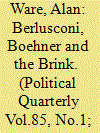

|
|
|
|
|
| Publication |
2014.
|
| Summary/Abstract |
In the early autumn of 2013 large minorities in Italy and the United States fermented crises that badly disrupted the government of the two countries. These cases were widely understood as instances of dysfunction in established democracies that would rarely be replicated elsewhere. However, while all the conditions that generated the crises are unlikely to be evident in other established democracies three important factors that caused the disruptions in the American and Italian political processes are also sources of political conflict in Britain. They are the powers of the second legislative chamber, the weakening links between parties and social groups, and the redrawing of electoral boundaries. All of them present problems for political reform in Britain, and understanding the role they played in the two political crises of 2013 is important for future reform in Britain.
|
|
|
|
|
|
|
|
|
|
|
|
|
|
|
|
| 2 |
ID:
130946
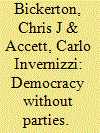

|
|
|
|
|
| Publication |
2014.
|
| Summary/Abstract |
This article looks at the legacy of 'Berlusconism' for Italian politics. On the right, we identify a process of fragmentation. As a result of the personalised leadership of Silvio Berlusconi, where loyalties and ties were to il cavaliere as an individual rather than to a party or a political tradition, there is little by way of legacy on the right. Surprisingly, we find that Berlusconi's greatest legacy lies on the left of Italian politics, in the figure of Matteo Renzi. In his savvy manipulation of the media and in the careful construction of his own image, accompanied by a non-ideological set of political slogans, Renzi has gone even further than Berlusconi. As a result, he may be the one to final bury Italian 'party government' and all its associated traditions and ideals.
|
|
|
|
|
|
|
|
|
|
|
|
|
|
|
|
| 3 |
ID:
129678
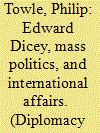

|
|
|
|
|
| Publication |
2014.
|
| Summary/Abstract |
The journalist, Edward Dicey, made an original contribution to the mid-nineteenth century debate on the growing involvement of the mass of people in political affairs. He argued that political education initially encouraged nationalism, causing the series of wars on which he reported. Beginning as an enthusiast for Camillo Cavour, the Piedmontese statesman, and the unification of Italy, Dicey became increasingly aware of the destructive impact of Irish nationalism on Britain and the threat to the British Empire from the growth of nationalist feelings amongst colonial peoples. However, he forecast that in the end, the forces of what at present is known as globalisation would bring nations closer together. Dicey is not well remembered today, but his work is important for showing the way in which a well-travelled Briton reacted to the breakdown in European security in the mid-nineteenth century and the growth of extra-European nationalism.
|
|
|
|
|
|
|
|
|
|
|
|
|
|
|
|
| 4 |
ID:
167235
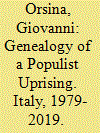

|
|
|
|
|
| Summary/Abstract |
After the 2018 general election, Italy became the only Western European country governed exclusively by anti-establishment forces. The importance of this goes beyond domestic implications, not only because what happens to the south of the Alps is relevant to the future of the European Union, but also because, with Italy often having been a bellwether for global trends, more general lessons can be drawn from its history. The Italian populist uprising can best be understood by looking at how the malfunctioning of the Italian public sphere, the anti-political zeitgeist, and the country’s struggle to squeeze itself into the European monetary straitjacket have interacted with each other over the last forty years. Two junctures are critical: the political and institutional earthquake of 1992-94, and the sovereign debt crisis of 2011 and its aftermath.
|
|
|
|
|
|
|
|
|
|
|
|
|
|
|
|
| 5 |
ID:
138602
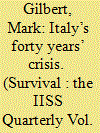

|
|
|
|
|
| Summary/Abstract |
The era of Silvio Berlusconi is over. Italy will never again be represented on the world stage by an ageing businessman with a turbulent private life, a criminal record and pariah status among other European leaders. Power has passed into the hands of a kinetic young man with a pudding-bowl haircut, Matteo Renzi, whose self-proclaimed mission is to rottamare (junk) the old guard in Italian politics and to revive the country’s institutions and economy.
|
|
|
|
|
|
|
|
|
|
|
|
|
|
|
|
| 6 |
ID:
129204
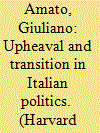

|
|
|
|
|
| Publication |
2014.
|
| Summary/Abstract |
Giuliano Amato is currently one of the 15 constitutional court judges of Italy, having served as the prime minister of Italy in the years 1992-93 and 2000-01. He also served as Minister of Interior and Treasurer during the Financial Crisis. He is often remembered as the treasurer who had the political strength to make a radical and controversial decision: withdrawing from people's bank accounts 6 per thousand of their capital, an economic operation aimed at rectifying the disastrous financial situation that Italy was facing at the time. He is one of the few politicians that have been prominent figures in Italian politics during both the First Republic (1948-1994) and the Second Republic (1994-present). His article is mainly about the thorny path he faced while transitioning between the two republics, largely due to a widespread political scandal. It depicts the uncertainty of the Italian politics as it was undergoing a deep change: several new political parties were forming in the beginning of the 1990s, and Italians put much faith in this transition. Amato was at the very forefront of this political renaissance, and has been a stand-out public figure throughout the turbulent last few decades of Italian politics.
|
|
|
|
|
|
|
|
|
|
|
|
|
|
|
|
|
|
|
|
|